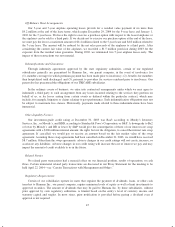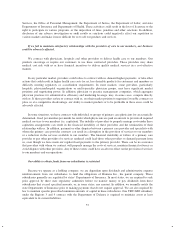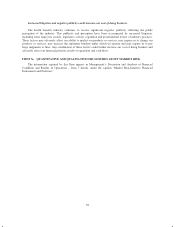Humana 2003 Annual Report Download - page 63
Download and view the complete annual report
Please find page 63 of the 2003 Humana annual report below. You can navigate through the pages in the report by either clicking on the pages listed below, or by using the keyword search tool below to find specific information within the annual report.
Our industry is currently subject to substantial government regulation, which, along with possible
increased governmental regulation or legislative reform, increases our costs of doing business and could
adversely affect our profitability.
The health care industry in general, and health insurance, particularly health maintenance organizations, or
HMOs, and preferred provider organizations, or PPOs, are subject to substantial federal and state government
regulation, including:
• regulation relating to minimum net worth;
• licensing requirements;
• approval of policy language and benefits;
• mandated benefits and processes;
• provider compensation arrangements;
• member disclosure;
• approval of acquisitions;
• approval of entry, withdrawal or re-entry into a state or market;
• premium rates; and
• periodic examinations by state and federal agencies.
State regulations require our licensed, operating subsidiaries to maintain minimum net worth requirements
and restrict some investment activities. Additionally, those regulations restrict the ability of our subsidiaries to
make dividend payments, loans, loan repayments or other payments to us.
In recent years, significant federal and state legislation affecting our business has been enacted. State and
federal governmental authorities are continually considering changes to laws and regulations applicable to us and
are currently considering regulations relating to:
• mandatory benefits and products;
• rules tightening time periods in which claims must be paid;
• medical malpractice reform;
• defining medical necessity;
• health insurance access;
• provider compensation and contract language;
• disclosure of provider fee schedules and other data impacting payments to providers;
• product flexibility and use of innovative technology;
• disclosure of provider quality information;
• health plan liability to members who fail to receive appropriate care;
• disclosure and composition of physician networks;
• formation of regional/national association health plans for small employers;
• physicians’ ability to collectively negotiate contract terms with carriers, including fees; and
• mental health parity.
All of these proposals could apply to us.
55
























